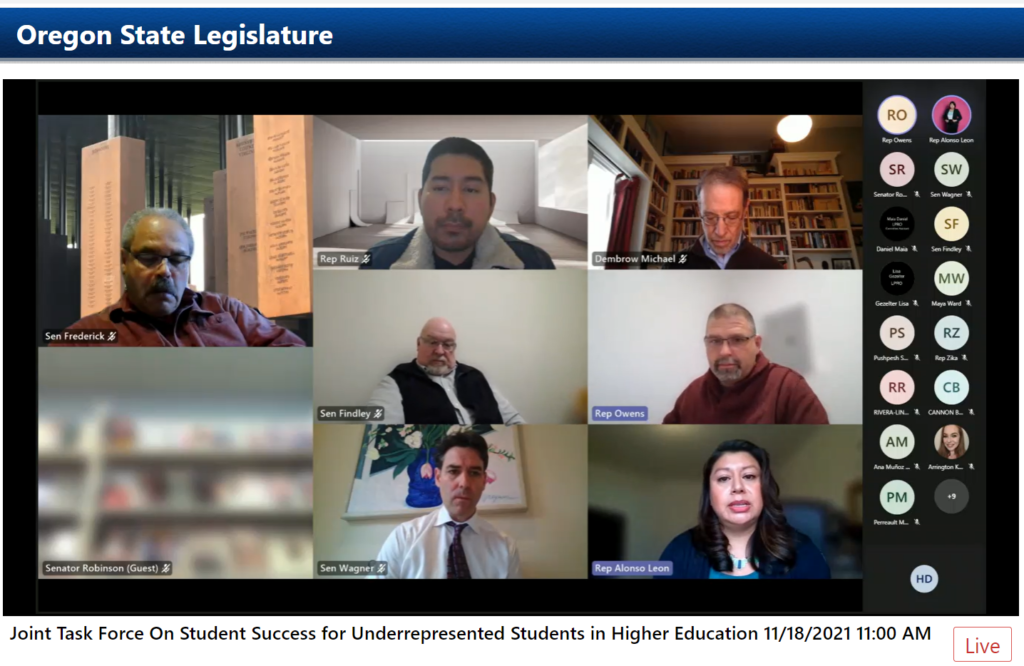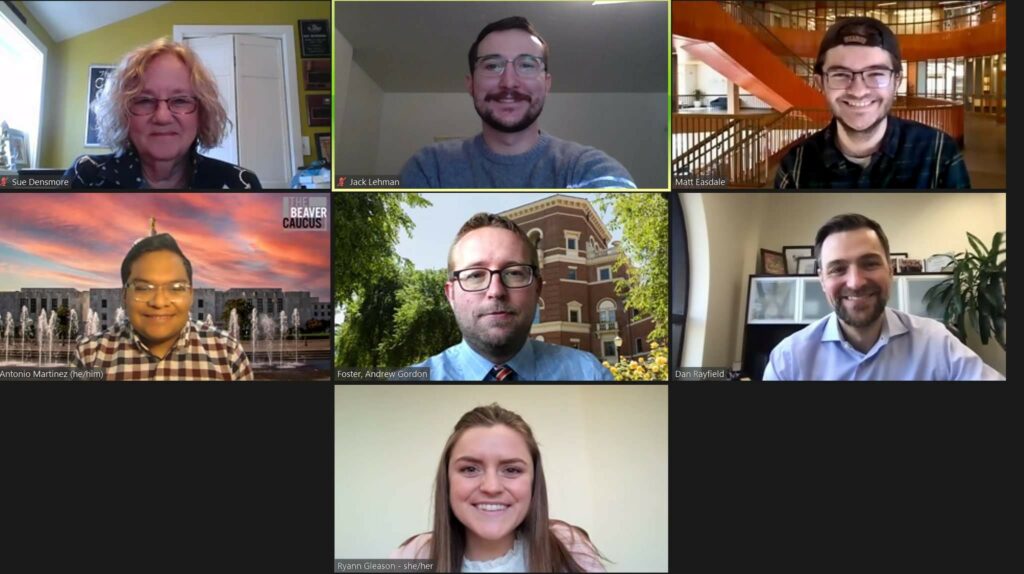Introduction and Funding Package
The 2023 legislative session started with many challenges that multiplied as the year progressed. While political friction and logistics hurdles slowed down the process in Salem, the work of Oregon State University advocates and members of the higher education coalition resulted in record investments in operating funds, student aid, OSU research, OSU Extension, and campus infrastructure.
In recent years, the Oregon legislature has seen a substantial turnover rate. The 2023 session introduced more than half of the House of Representatives’ 60-person membership as new members, while the Senate embraced the arrival of eight fresh faces. The November 2022 election also brought a change in the Governor’s Office and mostly new legislative leadership in both chambers.
This was the first fully in-person session since the COVID pandemic. However, ongoing construction and seismic improvements at the State Capitol interfered with bringing a true sense of normalcy back. Over half of the Capitol was closed, which limited public gathering space and closed the public café. Continuous construction noise filled the hallways and at times interrupted committee proceedings. The Governor, Secretary of State, State Treasurer, and legislative committee staff offices were temporally moved out of the Capitol. What may seem like logistical inconveniences breaks down the relationship building and communication flow that is critical to a fully functioning legislative session.
Unfortunately, these were all tensions placed on a legislature already plagued with a deep political divide. Differences over policies relating to reproductive and gender affirming care and guns, as well as parliamentary policies, led to an historic partisan walkout in the State Senate. The walkout of Republican and Independent senators threatened to curtail hundreds of policy bills and leave state agencies without sustainable operating budgets.
During the walkout, campus leaders diligently collaborated with the Governor, the Department of Administrative Services, and legislative leadership to devise plans aimed at minimizing the impacts on students and faculty if the state was unable to deliver expected funding throughout the summer.
Thankfully, a compromise was reached after 44 days which led to an operating quorum in the Senate. The final weeks of the session saw the legislature speed through their backlog, passing hundreds of policy bills and agency budgets within a little over a week.
While the 2023 legislative session highlighted the depth and intensity of Oregon’s political divide, the work of our coalition partners and OSU advocates resulted in a positive budget cycle for Oregon State University. We can celebrate the following investments for the 2023-2025 biennium:

Policy Bills
Outside of the budget realm, the legislature passed a variety of bills that feature funding for OSU’s research enterprise and other policies that will impact higher education:
SB 4: Semiconductor Package – Created a $190M grant and loan program to support businesses applying for federal CHIPS Act grants; allocated $10M to the University Innovation & Research Fund to match federal grants related to innovation and economic development (an additional $3M was added to the UIRF in an agency budget bill).
SB 161: Elliott State Research Forest Extension – Extended the deadline for required elements to be completed for the establishment of Elliott State Research Forest from June 30th to December 31, 2023.
SB 273: University Governance – Adds a graduated student and an additional non-voting undergraduate student to university governing boards; establishes processes for the nomination of undergraduate student, graduate student, faculty and nonfaculty staff to be nominated to the Governor for consideration; requires each governing board to formally adopt certain policies regarding university governance.
SB 355: Outside Counsel – Requires that public universities provide annual report on the use of outside counsel for legal matters on their website, rather than provide a report to the Attorney General.
SB 424: Transcript Holds – Prohibits the practice of withholding transcripts of current or former students due to debt to the institution.
SB 955: Agristress – Allocates $300,000 to the OSU Foundation to establish an endowment to fund the implementation and operation of an AgriStress Helpline for the purpose suicide prevention in the farming and ranching community.
HB 2010: Drought/Water Package – Directs Oregon Consensus at PSU and OSU to establish collaborative process for the development of shared understanding of water management in Chewaucan River watershed and allocated $150,000 to OSU for this work; allocates $3M for OSU Extension and Agricultural Experiment Station to jointly establish an agricultural water management technical assistance program and jointly prepare annual reports related to program and climate-related impacts on agricultural producers; allocates $365,000 to OSU for technical assistance to SWCDs conducing juniper treatment projects. These are OSU highlights of a larger policy and funding package.
HB 2049: Cybersecurity Center of Excellence – Establishes Oregon Cybersecurity Center of Excellence at PSU and jointly operated by PSU, OSU, and UO to coordinating, funding or providing cybersecurity education, awareness and training for public, private and nonprofit sectors, cybersecurity workforce development and cybersecurity-related goods and services to Oregon public bodies. Allocated $5M development and programing.
HB 2649: Agency Construction Requirements – Requires contractors doing public improvement projects for certain state entities, including public universities, have 12 to 15% of their workforce be apprentices and an aspirational target of 15% of their workforce be women, minority individuals and veterans.
HB 3409: Climate Package – Allocates $3M to OSU College of Forestry for the research development of low carbon fuels derived from woody biomass residues. These are OSU highlights of a larger policy and funding package.
HB 3410: Rural Economic Development – $2 million to OSU’s Center for the Outdoor Recreation Economy to be used for the purpose of developing professional and workforce development programs; $1 million to the Center for the Outdoor Recreation Economy to be used for the purpose of developing a pro-gram to provide facilitation services and technical assistance grants to communities affected by wildfire for community engagement in the planning and construction of outdoor recreation facilities to support the communities’ economic recovery; $500,000 to OSU-Cascades to outfit a fabrication and maker space at the university in order to support prototyping of new products by outdoor recreation economy entrepreneurs; $300,000 for technical assistance to rural seafood businesses conducted by the Oregon Coast Visitors Association, the OSU Food Innovation Center and the OSU Seafood Research and Education Center. These are OSU highlights of a larger policy and funding package.
HB 3456: Sexual Misconduct Training – Establishes a Sexual Misconduct Survey Council to develop a base sexual misconduct climate survey to be used annually by institutes of higher education; requires institutions to enter a MOU understanding with community-based domestic and sexual violence agency; requires annual delivery sexual misconduct primary prevention and awareness training.
Board Appointments
This session also brought appointments of new trustees to the OSU Board of Trustees. Last fall, the OSU Board of Trustees conducted a needs assessment that considered the number of members terming off the board. Collectively the board identified financial oversight, agriculture, higher education with a focus on community college, and tech/innovation as priority skills and backgrounds, along with a regional focus including Eastern Oregon. Governor Kotek nominated five at-large trustees and one student trustee; all six were confirmed by the Oregon Senate.
Stephanie Bulger, president, Lane Community College, Eugene.
Karla Chambers, vice president/co-owner, Stahlbush Farms, and a professional artist, Corvallis.
Grant Kitamura, owner, managing partner and CEO/CFO, Baker & Murakami Produce Co. in Ontario, OR; Fruitland, Idaho resident.
Gregory H. Macpherson, retired attorney, former state representative, Albany.
Elise McClure, former vice president of tax and customs, Starbucks Coffee Co, Portland.
Kasaundra A. Bonanno, undergraduate student in public healthy and public policy, Oregon State, Corvallis.
Thank you to retiring trustees for their dedication and service to OSU: inaugural at-large trustees Rani Borkar and Darry Callahan; at-large trustees Preston Pulliams and Lamar Hurd; student trustee Jax Richards; and in remembrance of inaugural Michelle Longo Eder, who passed away on March 12, 2023.

